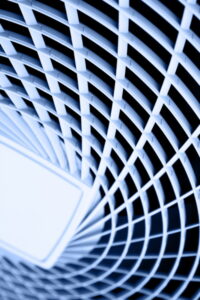
Your air conditioning runs on electricity, but the key source of how an AC actually does its job is the chemical refrigerant that circulates through it. We want to mention this upfront because people often make the mistake of thinking refrigerant is an energy source for an AC that can potentially run out after enough use. Refrigerant isn’t the power source of the AC: it’s a heat transference medium, which is a fancy way of saying that it’s what allows an air conditioner to move heat from the indoor air (cooling it down) to the outside.
Unfortunately, an AC’s copper refrigerant lines can develop leaks, and when that happens an air conditioner will be in all sorts of trouble, both short- and long-term. In this post we’re going to look at leaking refrigerant and why it’s a problem you’ll want fixed as soon as you notice it.
Refrigerant must stay at the AC’s factory determined-level
When professionals install a new air conditioning system, one of the important steps they take is to put refrigerant into it. This is known as charging the air conditioner, and the amount of chemical refrigerant put in the AC is called the AC’s charge.
Air conditioners are designed to run at a specific charge, and if the system doesn’t suffer from leaks, this charge will remain the same through the AC’s lifespan. Refrigerant does not dissipate as it carries out heat exchange because the AC is a sealed system.
What happens when leaks occur
When refrigerant begins to leak from an AC, it will cause a series of worsening problems. One of the first you might notice is an increase in humidity in the house as the evaporator coil starts to draw less moisture from the air along with the heat. This will also lead to the evaporator coil icing over, since the remaining refrigerant in the coil will not heat up enough and stay below freezing. The AC will then start to lose its overall cooling capacity. If you recognize these early warning signs, watch for other indicators that your AC needs repairs to prevent a complete system failure.
But the worst is ahead: because an AC is built for a specific refrigerant charge and pressure, a drop in charge will put the system in danger of overheating and failing. If the leaks aren’t sealed and the refrigerant recharged to its factory-determined level, the compressor will burn out. And a burnt-out compressor usually means the air conditioner itself is finished. At this point, it’s often smarter to decide whether it’s worth repairing or replacing the system altogether.
The “overcharged AC” problem
If you’ve wondered if an AC with too much refrigerant in it is also trouble, the answer is yes. The pressure inside the air conditioner will be too high, and this will also lower cooling power. Too much refrigerant jeopardizes the compressor because it risks something called slugging, which is when cold liquid refrigerant flows backwards into the compressor, mixing with the oil and causing the compressor to burnout. Overcharged air conditioners often happen because an amateur tried to “fix” an AC with more refrigerant or made an error when recharging lost refrigerant. To avoid this, it’s crucial to have repairs handled by professionals and to get AC repair services as soon as issues arise, ensuring your system is safely and properly maintained.
Call Moon’s Air for fast, effective AC repair
Refrigerant leaks aren’t anything you can fix on your own, and you shouldn’t trust an amateur with the job either. Always call our technicians for professional air conditioning repair in Shreveport, LA.
Moon’s Air has provided whole-home comfort since 1971. Call us for service today—it’s good to be Mooned!









